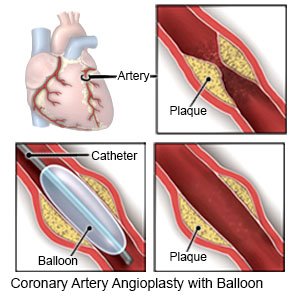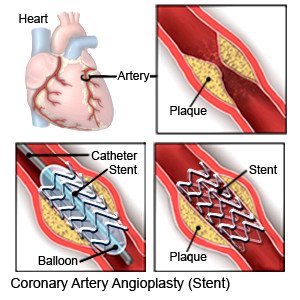Coronary Angioplasty
Medically reviewed by Drugs.com. Last updated on Aug 4, 2025.
What do I need to know about coronary angioplasty?
Coronary angioplasty is a procedure that opens arteries in your heart that have a buildup of plaque. Plaque is a mixture of fat and cholesterol. This procedure helps to increase blood flow to your heart.
How do I prepare for a coronary angioplasty?
- Your healthcare provider will talk to you about how to prepare for surgery. You may be told not to eat or drink anything after midnight on the day of your surgery. Your provider will tell you which medicines to take or not take on the day of your surgery.
- You may need blood tests and a stress test before your procedure. Talk to your provider about these or other tests you may need. Contrast liquid will be used during your procedure to help healthcare providers see your heart better. Tell the healthcare provider if you have ever had an allergic reaction to contrast liquid.
Related medications
What will happen during a coronary angioplasty?
- You will be given medicine in your IV to help you relax or make you drowsy. You will also get local anesthesia that will numb the area where the catheter (long, thin tube) will be placed. You will be awake during the procedure so that your healthcare providers can give you instructions. You may be asked to cough or hold your breath during the procedure.
- A catheter will be put into an artery in your groin or wrist. The catheter will be guided through this artery to your heart and into the narrowed or blocked artery. Healthcare providers will use x-rays and contrast liquid to find this artery. You may feel warm as the liquid is put into the catheter. A guidewire is then placed into this catheter. Healthcare providers may do any of the following to open your arteries:
- A balloon catheter is placed into the artery with the guidewire. Healthcare providers inflate the balloon several times for short periods. The inflated balloon pushes the plaque against the artery walls. This opens them and allows more blood flow to your heart.

- A stent may be placed into your artery. A stent is a tiny mesh tube or coil. Healthcare providers may use another balloon catheter to place a stent in your artery. The stent will be left in your artery to help keep it open.

- A catheter with a laser at the end may be placed into your artery. Healthcare providers may use energy from a laser to break up the plaque in your artery instead of using a balloon catheter.
- A balloon catheter is placed into the artery with the guidewire. Healthcare providers inflate the balloon several times for short periods. The inflated balloon pushes the plaque against the artery walls. This opens them and allows more blood flow to your heart.
What should I expect after a coronary angioplasty?
- Your healthcare provider will apply pressure for about 15 minutes to stop the bleeding. You may need to lie still for several hours if your leg was used for the procedure. Do not get out of bed until your provider says it is okay.
- You will need to stay in the hospital for at least the night after the procedure.
- Your provider may have you take aspirin or another medicine to prevent a blood clot from forming inside or around your stent.
What are the risks of a coronary angioplasty?
- You may develop a hematoma (swelling caused by collection of blood) or bleed more than expected from your catheter site. The contrast liquid used during angioplasty may cause an allergic reaction or kidney problems. You may develop an infection. An artery in your heart may become completely closed or have a spasm. If this happens, your heart will not get enough blood. This may cause chest pain or a heart attack. You might need heart surgery right away to bypass (go around) the artery.
- You may get a blood clot. The clot may cause life-threatening problems, such as a heart attack or stroke. Your arteries may become blocked again, and you may need another angioplasty or heart surgery.
Care Agreement
You have the right to help plan your care. Learn about your health condition and how it may be treated. Discuss treatment options with your healthcare providers to decide what care you want to receive. You always have the right to refuse treatment. The above information is an educational aid only. It is not intended as medical advice for individual conditions or treatments. Talk to your doctor, nurse or pharmacist before following any medical regimen to see if it is safe and effective for you.© Copyright Merative 2025 Information is for End User's use only and may not be sold, redistributed or otherwise used for commercial purposes.
Learn more about Coronary Angioplasty
Care guides
Further information
Always consult your healthcare provider to ensure the information displayed on this page applies to your personal circumstances.
